#union history
Text
During the pandemic, 28% of Black workers were classified as “essential,” doing the work of caring for others that put them and their families at great risk. In Professor Blair LM Kelley’s new book, Black Folk — The Roots of the Black Working Class, Kelley tells the story of her own working-class ancestors, stretching back into the 19th century, who also did the essential work of our economy. They suffered exploitation and violence as slaves, sharecroppers and maids but also forged bonds of mutuality with their families and fellow workers.
Black Folk charts the history of a family while also describing how African Americans built organizations — including churches, unions and support groups — fought for economic and political rights and had a nationwide impact. Black churches, Kelley writes, were sacred spaces that “retained their subversive power” by providing a vision of liberation while serving as a training ground for political struggles. And when white-run unions showed no interest in organizing Black workers, African Americans built their own unions, like the Brotherhood of Sleeping Car Porters, founded in 1925.
47 notes
·
View notes
Photo
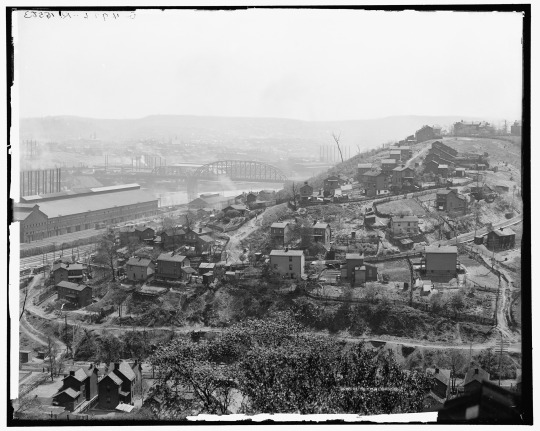


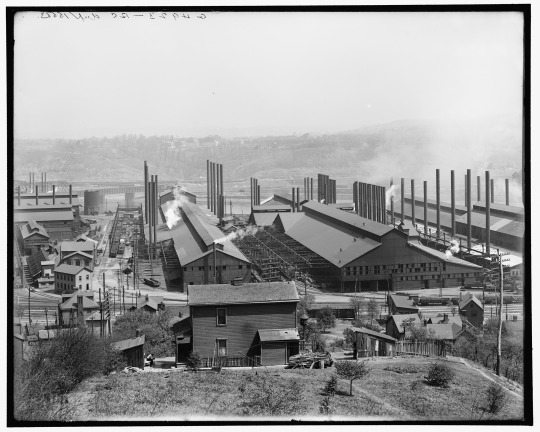
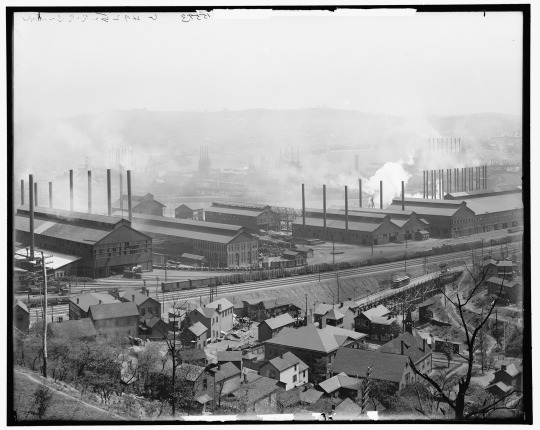
Homestead Steel Works, Homestead, Pa. Ca. 1900-1910.
Homestead Steel Works was a large steel works located on the Monongahela River at Homestead, Pennsylvania in the United States. The company developed in the nineteenth century as an extensive plant served by tributary coal and iron fields, a railway 425 miles (684 km) long, and a line of lake steamships. The works was also the site of one of the more serious labor disputes in U.S. history, which became known as the Homestead strike of 1892.
The steel works were first constructed in 1881. Andrew Carnegie, (a Scottish emigrant), bought the 2 year old Homestead Steel Works in 1883, and integrated it into his Carnegie Steel Company. For many years, the Homestead Works was the largest steel mill in the world and the most productive of the Mon Valley's many mills.
A series of industrial disputes over wages, working hours and contracts occurred in the early years of the works, leading to the Homestead strike, an industrial lockout and strike which began on June 30, 1892, culminating in a battle between strikers and private security agents on July 6, 1892. The battle was one of the most violent disputes in U.S. labor history and the final result was a major defeat for the union and a setback for their efforts to unionize steelworkers.
#pennsylvania#homestead strike#Steel Industry#Dry Plate Negatives#Monongahela River#union history#labor rights#labor unions#Carnegie
99 notes
·
View notes
Link
74 notes
·
View notes
Video
History of Right to Work Laws
#tiktok#right to work#labor vs capital#capital vs labor#labor rights#labor movement#labor#labor movements#union workers#labor unions#trade unions#unions#american racism#collective action#union organizing#union history#labor history#history#workers rights#wages and salaries#wages
21 notes
·
View notes
Text
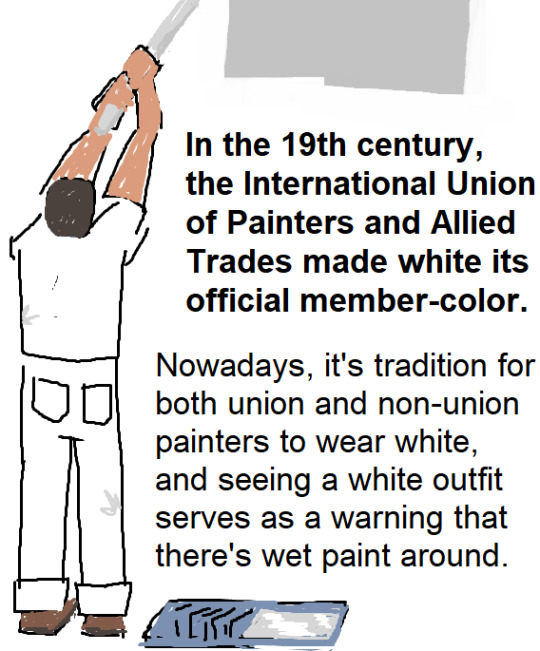
one reason for choosing the color in the first place was that many of the materials P&AT used in their work were also white.
20 notes
·
View notes
Photo
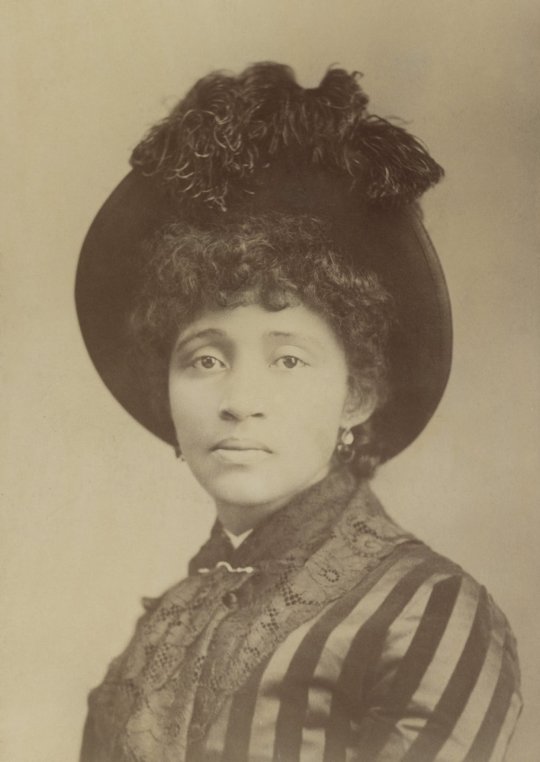
Lucy Parsons, labor organizer and IWW founder
6 notes
·
View notes
Text
I Can't Feel The Sunshine, poem by Lesbia Harford (April, 1915)
I can't feel the sunshine
Or see the stars aright
For thinking of her beauty
And her kisses bright.
She would let me kiss her
Once and not again.
Deeming soul essential,
Sense doth she disdain.
If I should once kiss her,
I would never rest
Till I had lain hour long
Pillowed on her breast.
Lying so, I'd tell her
Many a secret thing
God has whispered to me
When my soul took wing.
Would that I were Sappho,
Greece my land, not this!
There the noblest women,
When they loved, would kiss.
Lesbia Harford (1891-1927) was an Australian poet, novelist, and political activist. [1] Harford graduated with a Bachelor of Law from the University of Melbourne in 1916.
An advocate for free love, Lesbia formed 'lifelong parallel attachments to both men and women', and her poetry was often Sapphic.
Her known lovers include Katie Lush, philosophy tutor at Ormond College; Guido Barrachi, one of the founding members of the Communist Party of Australia; and Pat Harford, her husband, and fellow member of the International Workers of the World (IWW, or Wobblies).
Lesbia began working in a textile & clothing factory in 1917, and joined the Wobblies that same year. She became Vice President of the Federated & Clothing Allied Trades Union in 1918. She was a fierce campaigner for the release of fellow Wobblies, the Sydney Twelve, and noted for her work as an anti-conscriptionist.
Sadly, Lesbia died aged 36 of lung & heart failure (cause still debated). The great majority of her writing was published after her death.
[1] Unless otherwise specified, I'm using the sources cited in Lesbia's Wikipedia page, as it's well written & collates many sources including items stored in the National Library about her life. https://en.m.wikipedia.org/wiki/Lesbia_Harford
#Lesbia Harford#poetry#female poets#poetsandwriters#poets corner#sapphic#wlw poem#bisexual#International Workers of the World#wobblies#communist party of australia#union history#polyamory#sapphic poetry
7 notes
·
View notes
Text
If you want an overview of the US labor movement, I cannot recommend enough “A History of America in Ten Strikes” by Erik Loomis.
Although it’s hard to read in its contents, it’s easy to read in how it’s written, and really shows both how the structure of our nation has shaped working here and how the labor movement has developed over time
1 note
·
View note
Text
0 notes
Text
I will literally never shut up about Larry Itliong: I'm thinking about taking a scholarship exam on unions/worker's rights and can you believe this is what the study guide has to say about Delano
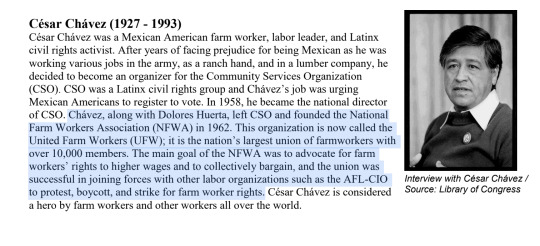

You can literally see the holes where the Filipinos have been omitted -- why did the National Farm Workers Association change its name? The closest Filipinos get to acknowledgement is technically counting as "Latinx" in the second screenshot.
People have rewritten the Delano Grape Strike so hard, and for what purpose? We can't have any Asian Americans who aren't model minorities, can't remove wedge of a myth diving us? Mexican farm workers fit the American collective racial imagination so well we can't see anything else? So it seems people have conceived this history to perfectly align with the stereotypes they already have...
The Delano Grape Strike was started by Filipinos. Larry Itliong led the Agricultural Workers' Organizing Committee along with many other Filipino activists. Delano was Filipino/Mexican solidarity -- workers from Asia and workers from Latin America joining union forces and succeeding. Remember this, forever and ever.
#unions#union history#labor movement#I said this#history#racism#filipino#latine#image undescribed#larry itliong#delano grape strike
1 note
·
View note
Note
Hi- er, this is my first-ever writer's strike, how does one not cross a picket line in this context? I know how not to do it with things like Amazon and IRL strikes, but how does it apply to media/streaming?
Hi, this is a great question, because it allows me to write about the difference between honoring a picket line and a boycott. (This is reminding me of the labor history podcast project that's lain fallow in my drafts folder for some time now...) In its simplest formulation, the difference between a picket line and a boycott is that a picket line targets an employer at the point of production (which involves us as workers), whereas a boycott targets an employer at the point of consumption (which involves us as consumers).
So in the case of the WGA strike, this means that at any company that is being struck by the WGA - I've seen Netflix, Amazon, Apple, Disney, Warner Brothers Discovery, NBC, Paramount, and Sony mentioned, but there may be more (check the WGA website and social media for a comprehensive list) - you do not cross a picket line, whether physical or virtual. This means you do not take a meeting with them, even if its a pre-existing project, you do not take phone calls or texts or emails or Slacks from their executives, you do not pitch them on a spec script you've written, and most of all you do not answer any job application.
Because if this strike is like any strike since the dawn of time, you will see the employers put out ads for short-term contracts that will be very lucrative, generally above union scale - because what they're paying for in addition to your labor is you breaking the picket line and damaging the strike - to anyone willing to scab against their fellow workers. GIven that one of the main issues of the WGA are the proliferation of short-term "mini rooms" whereby employers are hiring teams of writers to work overtime for a very short period, to the point where they can only really do the basics (a series outline, some "broken stories," and some scripts) and then have the showrunner redo everything on their lonesome, while not paying writers long-term pay and benefits, I would imagine we're going to see a lot of scab contracts being offered for these mini rooms.
But for most of us, unless we're actively working as writers in Hollywood, most of that isn't going to be particularly relevant to our day-to-day working lives. If you're not a professional or aspiring Hollywood writer, the important thing to remember honoring the picket line doesn't mean the same thing as a boycott. WGA West hasn't called on anyone to stop going to the movies or watching tv/streaming or to cancel their streaming subscriptions or anything like that. If and when that happens, WGA will go to some lengths to publicize that ask - and you should absolutely honor it if you can - so there will be little in the way of ambiguity as to what's going on.
That being said, one of the things that has happened in the past in other strikes is that well-intentioned people get it into their heads to essentially declare wildcat (i.e, unofficial and unsanctioned) boycotts. This kind of stuff comes from a good place, someone wanting to do more to support the cause and wanting to avoid morally contaminating themselves by associating with a struck company, but it can have negative effects on the workers and their unions. Wildcat boycotts can harm workers by reducing back-end pay and benefits they get from shows if that stuff is tied to the show's performance, and wildcat boycotts can hurt unions by damaging negotiations with employers that may or may not be going on.
The important thing to remember with all of this is that the strike is about them, not us. Part of being a good ally is remembering to let the workers' voices be heard first and prioritizing being a good listener and following their lead, rather than prioritizing our feelings.
28K notes
·
View notes
Text
You’re Lucky You Have a House, Peasant!
A history of company towns
by Joyce Rice and Kevin Moore
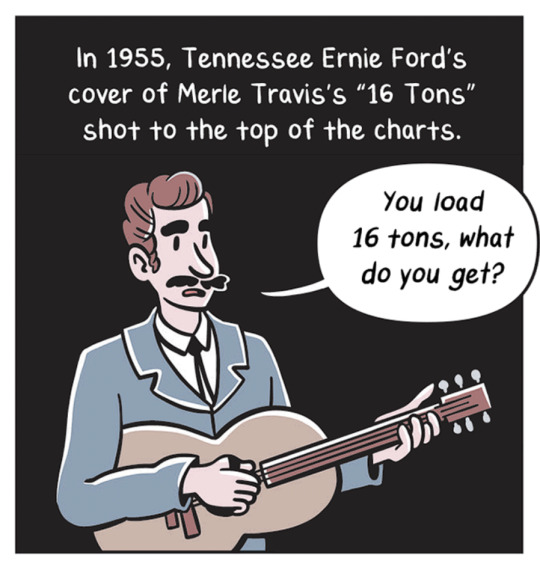
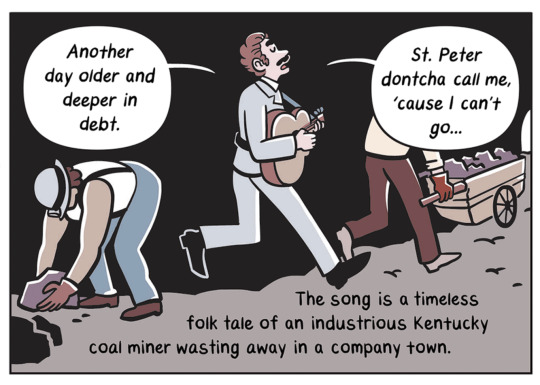
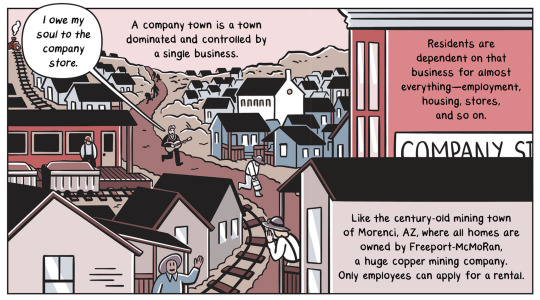
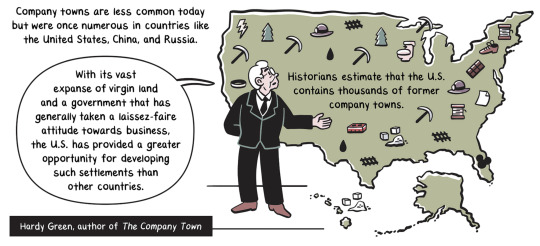
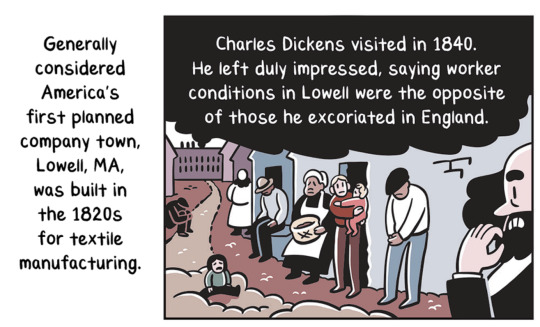
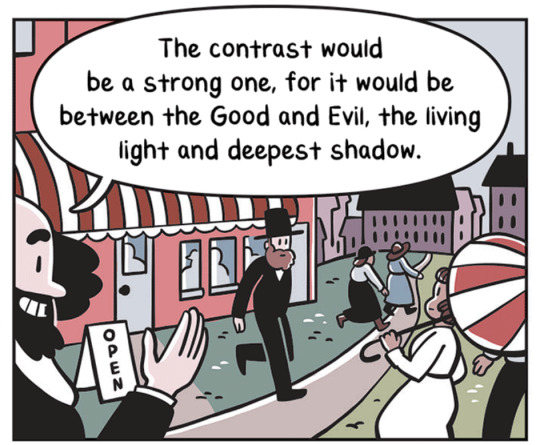
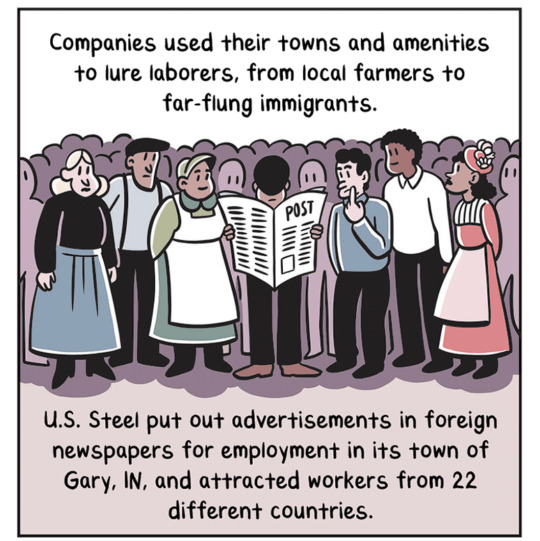

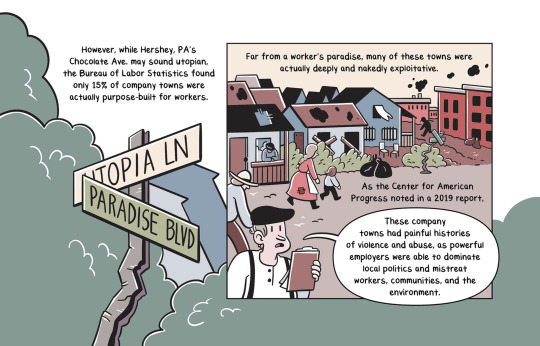
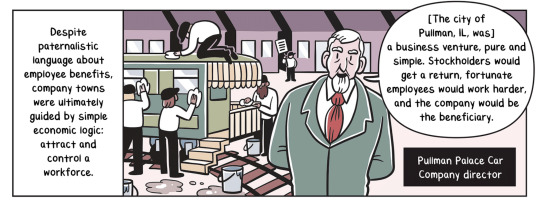

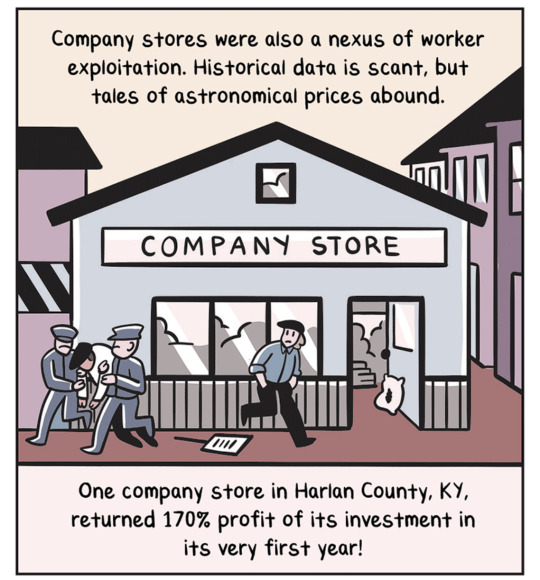
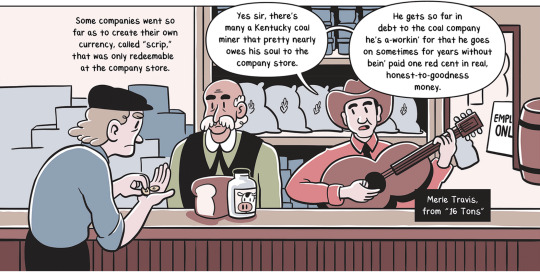
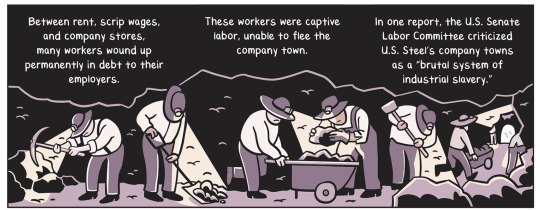

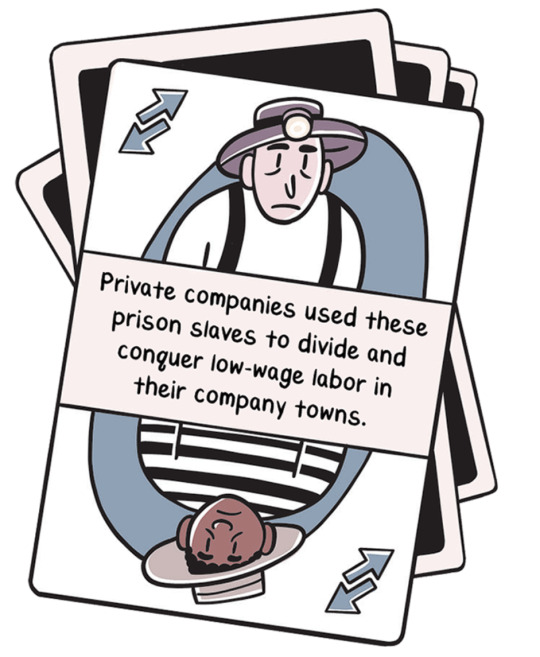
(Continue Reading)
TheNib.com
@thenib
#politics#the left#the nib#comic#webcomic#labor#Labor Unions#organized labor#history#capitalism#economic inequality#oppression#poverty#working class#long post#long reads
14K notes
·
View notes
Text
✨✨ Congratulations to Sega of America and our INDUSTRY LEADING union contract ✨✨
With a gratifyingly massive vote in favour we ratified our contract guaranteeing worker protections, increased wages, credit for all games worked on and more!
We are the largest and only multi-department video game union, and hope this joyous news will encourage others to organize and fight for their own employee rights in our beloved, but layoff-plagued industry.
I'M SO PROUD TO BE A MEMBER OF AEGIS 💙💙

#sega#sonic#sonic the hedgehog#video games#unions#atlus games#labor rights#WE DID IT#we're history makers!!#SONIC SAYS UNIONIZE#FIGHT FOR YOUR WORKER RIGHTS#if we did it so can youuuu
2K notes
·
View notes
Text

Soviet New Year tree lights, 1960s.
#russia#russian#soviet aesthetic#ussr#soviet#soviet union#russian history#sovietwave#1960s aesthetic#1960s
3K notes
·
View notes
Note
I’m suddenly getting swathes of Lancer hate across my feed… Has something happened in the fandom? “Union is ______ how could they paint them as even remotely good. They allow _____, and I hate the devs they are ______. The whole thing is just 40k with communist veneer”.
Like am I taking crazy pills…? I thought that all of the problems were literally like right there on the tin “we are a utopia in progress! We will obtain it by any means possible even if it means being everything we say we are not/fighting against. As the player you decide what is right. How much will you ignore for someone else’s idea of utopia?” Like doesn’t it mean all the tools to actually change are there and that is the HOPE aspect of all of this?
(Sorry if this in incoherent grammar is a weak point and I pulled something in my back simply standing up. Now I am sad and crook backed in spasmodic pain)
This isn't an argument I feel super enthusiastic about stepping into, because it gets the most annoying sort of people in your mentions eager to maliciously misrepresent what you say.
However, yeah, there are some pretty terrible readings of Union floating around. I'd invoke "media literacy" because think that a lot of this comes from people not really holistically engaging with the fictional future history of Lancer, but also from a sort of dogmatic purism that requires future societies to be flawless, else they're irredeemable.
It is important to note that ThirdComm is the direct descendant of two highly imperfect societies. FirstComm was formed as a response to the Three Great Traumas of discovering the Massif Vaults (and thus that they were the inheritors of a fallen world), the wars over the Massif Vaults, and the discovery of the lost colonies, all of which collectively showed humanity how close it had come to total extinction.
FirstComm decided that it had a responsibility to ensure that humanity never risked extinction again. It manifested this by trying to colonize every habitable planet it could find, pumping out ship after ship to seed the cosmos with as much human life as it possibly could. This led to problems when it encountered civilizations like the Karrakin Federation and the Aun, who had been carrying humanity's torch just fine by themselves, thank you very much.
SecComm was an Anthrochauvinist fascist state. The book defines it thusly:
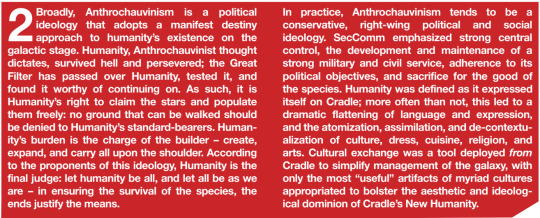
We can see a lot of Anthrochauvinist historical romanticism in the mech naming schemes of Harrison Armory, SSC and IPS-N - the fact that Harrison Armory names its mechs after great military leaders of pre-Fall Earth history, IPS-N does the same with naval figures, and SSC uses the names of Earth animals. Even the GMS Everest is named for a mountain on Earth. It's very Cradle-centric.
Anthrochauvinism was, to be clear, largely just an excuse for colonialism and hegemony. Atrocities could easily be justified under by stating that whoever they're being committed against were a threat to the Continuance of Humanity - a term that SecComm got to define.
It's also at this point that we have to zoom in from broad sociopolitical points to address one very specific piece of history: the New Prosperity Agreement. This was signed to prevent the outbreak of a Second Union-Karrakin War, and mandated that the Karrakin Houses would maintain privileged levels of autonomy within Union, and that they would be granted colonial rights to the entire Dawnline Shore. This agreement, struck in 3007u, basically defines much of the current political situation today.
ThirdComm was a final and inevitable reaction to the atrocities, abuses and excesses of SecComm. The unspeakable horrors of Hercynia were the spark, but I need to stress how little Hercynia actually mattered in the larger Revolution - at the start of NRfaW, it's explicitly stated that almost nobody in the galaxy even knows where it is, let alone what happened there. The Revolution was a generalized response to SecComm's tyranny, with no single rallying cry.
The Revolution might also have failed entirely, but for a critical error by Harrison Armory: pissing off the Karrakin Trade Baronies. After getting kicked off Cradle, the Anthrochauvinist Party organised a fleet at Ras Shamra to try and retake Cradle. Simultaneously, however, they were attempting to secure protectorate agreements to steal worlds in the Dawnline Shore out from under the KTB. Putting these two together and making five, the KTB assumed that the fleet was pointed at Karrakis, and started the First Interest War.
The First Interest War initially favoured the KTB. They smashed the fleet above Ras Shamra and simultaneously conquered the moon of Creighton in the Dawnline Shore. However, they underestimated just how ruthless Harrison I was - he "retook" Creighton by relativistic bombardment, and then conquered four of the 12 worlds of the Dawnline Shore with mechanised chassis, a technology the KTB had not adopted and had no counter for.
To prevent further loss of life, Union was eventually forced to broker a peace agreement that saw Harrison I handing himself over to Union justice in return for Harrison Armory's continued sovereignty, and the KTB joining Union as a full member state.
So, with that historical context out of the way, let me get to the second part of this absurd essay I'm writing.
Third Committee Union isn't a civilization that arose from whole cloth. It's shaped by five thousand years of Union history, six thousand years of post-Fall history, and six thousand years of pre-Fall history before that. It is, ultimately, an extremely well-thought-out and well-worldbuilt fictional polity, in that all of its imperfections come from traceable root causes in its history.
Why does ThirdComm permit the abuses of the KTB? Because to stop them, it would likely have to go to war, and such a war would butcher billions. Worse, to do so, it would probably have to ally with Harrison Armory and make horrific concessions.
Why does ThirdComm permit the expansionism and cryptochauvinism of the Armory? Because to stop them, it would likely have to go to war, and such a war would butcher billions. Worse, to do so, it would probably have to ally with the KTB and make horrific concessions.
Nobody in CentComm likes that Harrison Armory are empire-building expansionists. Nobody in CentComm likes that the KTB has a hereditary nobility and enforces blockades against planets that rebel against it. The problem is that ThirdComm is, in historical terms, still relatively new. They've been around five hundred years, and compared to the 1600 years that SecComm was around and the 2800 years FirstComm existed for, that's not very much.
ThirdComm is attempting to decouple itself from the Cradle-first politics of its predecessor, and to amend the many, many atrocities committed in the name of Humanity. It is not easy to do any of these things. SecComm was defined almost entirely by the fact that if it didn't like what you were doing, it would send in the military as a first response. Every time ThirdComm chooses to do the same, its legitimacy erodes, because the mission of ThirdComm is to prove that diverse, vibrant and compassionate human civilization can exist without devolving into war and bloodshed. ThirdComm always tries diplomacy as a first response because if it doesn't, millions of people could die.
511 notes
·
View notes
Text
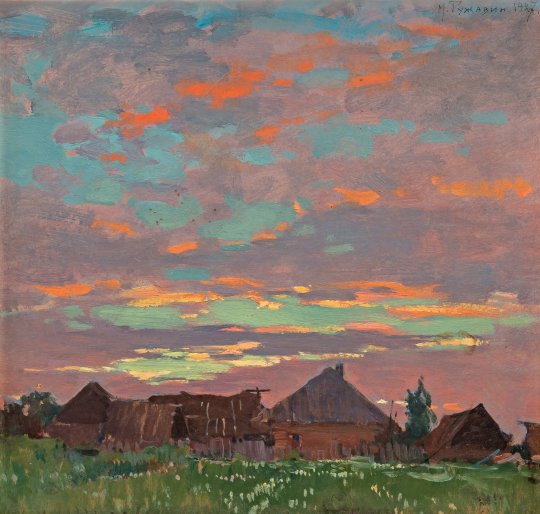
Dusk, Mikhail Guzhavin, 1927
#art#art history#Mikhail Guzhavin#landscape#landscape painting#evening#evening scene#dusk#Russia#Soviet Union#Russian art#Soviet art#20th century art#oil on panel
1K notes
·
View notes